|
|
|
Sort Order |
|
|
|
Items / Page
|
|
|
|
|
|
|
| Srl | Item |
| 1 |
ID:
108734
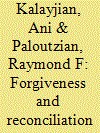

|
|
|
|
|
| Publication |
Dordrecht, Springer Science and Business Media, 2009.
|
| Description |
xxii, 303p.
|
| Series |
Peace Psychology Book Series
|
| Standard Number |
9781441901804
|
|
|
|
|
|
|
|
|
|
|
|
Copies: C:1/I:0,R:0,Q:0
Circulation
| Accession# | Call# | Current Location | Status | Policy | Location |
| 056400 | 155.9/KAL 056400 | Main | On Shelf | General | |
|
|
|
|
| 2 |
ID:
069647


|
|
|
| 3 |
ID:
138159
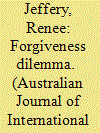

|
|
|
|
|
| Summary/Abstract |
In post-conflict politics, forgiveness is as controversial as it is popular. Generally conceived as the overcoming of negative moral emotions such as resentment and anger, forgiveness is, on the one hand, credited with bestowing significant psychological benefits on its practitioners, contributing to processes of interpersonal and societal reconciliation, and avoiding revenge. On the other hand, however, critics warn that rather than helping to address the negative emotions, forgiveness actually helps to provoke resentments and grievances by heaping injustice upon injustice. Herein lies the dilemma with which this article is concerned. By examining the nature of the negative emotions and their relationship to the pursuit of justice, as well as the nature and consequences of forgiveness, it considers the role that victim participation in human rights trials plays in helping post-conflict societies to overcome the forgiveness dilemma. To do so, it focuses on Case 001, heard before the Extraordinary Chambers in the Courts of Cambodia.
|
|
|
|
|
|
|
|
|
|
|
|
|
|
|
|
| 4 |
ID:
104058
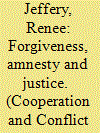

|
|
|
|
|
| Publication |
2011.
|
| Summary/Abstract |
The practice of forgiveness in processes of conflict resolution and post-conflict justice is confronted by two sets of serious criticisms. First, scholars and practitioners alike have questioned whether or not the fundamentally interpersonal practice of forgiveness can be readily and legitimately transposed to broader socio-political contexts. Second, questions have also been raised concerning the potential for forgiveness, particularly when associated with amnesties, to jeopardize and even circumvent the application of justice in post-conflict contexts. By contrast, supporters argue that forgiveness is not only possible but necessary in politics and, by drawing a distinction between amnesties and forgiveness, and restorative and retributive forms of justice, that forgiveness contributes to the achievement of restorative justice. By analysing the role that forgiveness is playing in bringing almost two decades of conflict between the Lord's Resistance Army and the Ugandan government to an end, this article demonstrates that a disjuncture exists between the theoretical treatment of forgiveness and the practice of political forgiveness. That is, it demonstrates, contrary to arguments made by both its supporters and critics, that political forgiveness, even when conceived in conjunction with amnesties, may contribute to both restorative and retributive forms of justice.
|
|
|
|
|
|
|
|
|
|
|
|
|
|
|
|
| 5 |
ID:
178396
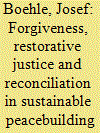

|
|
|
|
|
| Summary/Abstract |
Since the mid 1990s, growing attention has been given in the scholarly debate and in the public sphere to forgiveness, restorative justice and reconciliation in peacebuilding. These concepts have been reflected upon and highlighted as core components of restoring right relationships and in sustainable peacebuilding: at first focusing mainly on individuals and relations between them and later as well on relations of communities and states in the public sphere. Attempts to better understand forgiveness and reconciliation in relation to peacebuilding have to address also the critical issue of how to safeguard and integrate processes of justice into peace processes. After first clarifying the distinction between retributive and restorative justice, this article considers core findings of Daniel Philpott, John Paul Lederach and Leonel Narvaez in their peacebuilding studies and considers selected, contemporary reconciliation and peace initiatives. The article argues that forgiveness, restorative justice and reconciliation processes should be further mainstreamed and integrated as part of any standard response to major conflicts and wars by national political bodies, religious communities and religious/secular NGOs, international organisations, agencies and institutions: in order to positively and sustainably resolve and transform conflicts, wars and violence between groups, and to build sustainable peace.
|
|
|
|
|
|
|
|
|
|
|
|
|
|
|
|
| 6 |
ID:
090354


|
|
|
|
|
| Publication |
2009.
|
| Summary/Abstract |
This article examines why states ask for forgiveness from other states or peoples that they have harmed. Asking for forgiveness has significant political, legal, and moral implications. But beyond these, the subject concerns how states confront their history and their collective responsibility for wrongdoing. My focus on the reasons states have for asking forgiveness could also improve our understanding of conflict resolution. The article introduces an innovative typology of requests for forgiveness by presenting important conceptual distinctions in the terminology currently employed in the field. Apologies, regrets, and expressions of sorrow are conceptualised as distinct avenues of asking forgiveness with varying degrees of significance and meaningfulness. I assert that the type of request for forgiveness is influenced by the degree of severity attributed to a wrongdoing and by the extent to which a state perceives its image as threatened by its wrongful act. The article analyses the important 1951 statement of West Germany's Chancellor Adenauer regarding the Jewish Holocaust as an example of a type of request for forgiveness.
|
|
|
|
|
|
|
|
|
|
|
|
|
|
|
|
| 7 |
ID:
169003
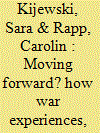

|
|
|
|
|
| Summary/Abstract |
How does civil war shape the prospects of lasting peace between formerly opposing ethnic groups after the end of violence? This article addresses the complex relationship between war experience, interethnic attitudes, interethnic forgiveness, and the willingness to permit basic civil liberties to former enemies in the context of postwar Sri Lanka. Despite the end of the 26-year-long civil war in 2009, social and political tensions between the two largest ethnic groups, the Sinhalese and the Sri Lankan Tamils, still prevail. Political tolerance is in the literature considered a crucial micro-level condition for peaceful coexistence, yet, its determinants, in particular the role of war experiences, have not received sufficient attention. Using new and unique all-island representative survey data (N = 1,420), we examine the mutual permission of civil liberties of these two ethnic groups. Our analyses reveal two important findings: first, the likelihood of granting civil liberties varies by civil liberty and ethnic group. Whereas most members of both ethnic groups are willing to grant the right to vote, to hold a speech, and to hold a government position, the right to demonstrate is highly contested, with only low shares of both Tamils and Sinhalese being willing to grant the other group this right. Second, the structural equation models reveal that the direct impact of war exposure is less powerful than expected and depends on the political right in question. Not forgiving the other ethnic group, partly driven by war experience and ethnic prejudice, appears to be a more consistent predictor of intolerance. These results imply that postwar efforts to further forgiveness are important to promote political tolerance and thereby long-lasting peace.
|
|
|
|
|
|
|
|
|
|
|
|
|
|
|
|
| 8 |
ID:
094316
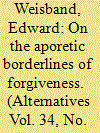

|
|
|
|
|
| Publication |
2009.
|
| Summary/Abstract |
This article focuses on representations of forgiveness as adopted or assumed by processes of collective amelioration experienced in the aftermath of mass atrocity. It seeks to demonstrate how each representative approach to forgiveness captures some of the torment, pain, and suffering of survivor and successor generations, but also that each fails to accommodate the depths and complexities of personal grief and collective mourning. Too often transnational justice in the aftermath of political evil becomes grounded in assumptions of justice, truth, and apology that are severely delimited. Such strategic and theoretical perspectives are insufficiently attuned to the needs of bereavement as a political form because they fail to promote social solace by means of collective atonement on the part of survivor and successor generations who inherit the legacies of sorrow. If political bereavement conducive to collective amelioration is to occur in any one polity, it should be legitimated by a transnational system of "transnational legacy sites," exclusively devoted to the designation, protection, and intercultural connection of all the many places where political evil may be said to have occurred.
|
|
|
|
|
|
|
|
|
|
|
|
|
|
|
|
|
|
|
|
|